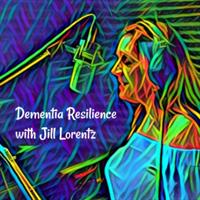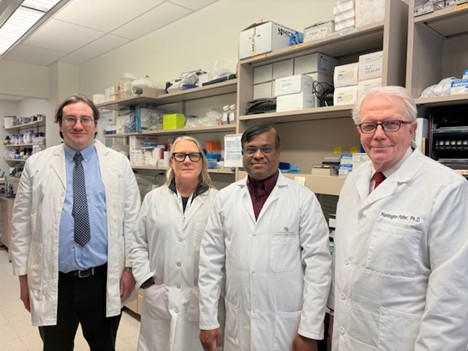CU Alzheimer's and Cognition Center in the Media
Experts from the CU Alzheimer's and Cognition Center, formerly known as the Rocky Mountain Alzheimer's Disease Center, are commonly interviewed and featured in local and national news articles. This page lists an up-to-date collection of news pieces that feature one of our many experts in the field of Alzheimer's and Cognition research. Find a list of all podcasts featuring CU Alzheimer's and Cognition Center experts.
Brain Neuron Death Occurs Throughout Life and Increases with Age, A Natural Human Protein Drug May Halt Neuron Death in Alzheimer’s
Scientists at the University of Colorado Anschutz have discovered that while brain neuron changes, including cell loss, may begin in early life, a drug long-approved for other conditions might be repurposed to slow this damage, offering new hope for those with Alzheimer’s disease (AD) and other cognition issues.
The drug, sargramostim (also called Leukine), a synthetic form of the natural human protein GM-CSF, has been used for 30 years to treat a variety of conditions including cancer. It has also shown promise in its first clinical trial by improving blood biomarkers of brain pathology.
The study was published today, December 19, 2025, in the journal Cell Reports Medicine.
Sargramostim (Leukine) is being tested in a Phase II trial (SESAD) at CU Anschutz and is recruiting participants. Learn more about how to participate in the SESAD trial.
Please also consider supporting our research with a gift to the Potter Alzheimer's Research Fund.
“This drug improved one measure of cognition and reduced a blood measure of neuron death in people with AD in a relatively short period of time in its first clinical trial.”
- Huntington Potter, PhD, director of the University of Colorado Alzheimer's and Cognition Center.
The 3 things a person can do to keep peak brain health, according to researchers
In the article "The 3 things a person can do to keep peak brain health, according to researchers" by Fox10 Phoenix, Dr. Christopher M. Filley of the CUACC is referenced as a subject expert on white matter. The article uses his definition of white matter as a reference.
[Grey Matter] refers to regions throughout the brain where nerve cells – known as neurons – are concentrated, according to Dr. Christopher M. Filley, a professor of neurology and psychiatry and the director of the behavioral neurology section at the University of Colorado Medical School.
CellSight Teams Clinch Top Two of Three Awards in National Eye Institute Competition
In the article "CellSight Teams Clinch Top Two of Three Awards in National Eye Institute Competition" by CU Anschutz Today, it was announced that "the University of Colorado Department of Ophthalmology's ocular stem cell and regeneration research program, CellSigth, was awarded the top two prizes in the National Eye Institute (NEI)'s 3D Retinal Organoid Challenge." One of the teams to win the Drug Screening award, led by Dr. Natalie Vargara, included CU Alzheimer's and Cognition Center faculty members, Dr. Huntington Potter and Dr. Noah Johnson.
“All three of the teams exemplified [the importance of team efforts behind the research],” Chiang says. “I really love the spirit of all of you. The reason that we’re doing this is to cure blindness, eliminate vision loss, and improve quality of life.” - NEI director Dr. Michael Chiang
Scientists look to people with Down syndrome to test Alzheimer's drugs
In the NPR story, "Scientists look to people with Down syndrome to test Alzheimer's drugs", Dr. Huntington Potter and other CUACC researchers are interviewed about their research into Down Syndrome and Alzheimer's Drugs, and Dr. Potter specifically discuses his research with GM-CSF and how it may be used to improve cognition.
That then allowed us to apply for a grant to study young adults with Down syndrome before they get Alzheimer's disease - Dr. Huntington Potter, quote from NPR story
Researchers Find Two FDA-Approved Drugs That Curb Symptoms of Alzheimer’s Disease
The article "Researchers Find Two FDA-Approved Drugs That Curb Symptoms of Alzheimer’s Disease" by CU Anschutz Today discusses research published by a CU Alzheimer's and Cognition Center research team, led by Dr. Noah Johnson. Both Dr. Johnson and Dr. Huntington Potter were interviewed about the research results, which found two drugs from a retrospective study that may have improved cognition in people. The study involved researchers looking at patient histories from a national database to see if any drugs had an impact on cognition.
We took a unique approach by targeting APOE4 because the usual drug targets, amyloid-beta and tau, have not produced a convincingly effective drug for people with AD despite decades of work - Dr. Noah Johnson, quote from CU Anschutz Today article
People With Intellectual and Developmental Disabilities Struggled With Mental Health During COVID-19 Shutdowns
The article "People With Intellectual and Developmental Disabilities Struggled With Mental Health During COVID-19 Shutdowns" by CU Anschutz Today discusses the research on the effect of COVID-19 and resulting lockdowns and social distancing on the mental health of people with intellectual and developmental disabilities, led by CUACC provider Dr. Jessica Solomon Sanders.
We as doctors can do all we want and all we can to help manage medication and appointments, but the difference that affected everyone in this pandemic is loss of access to community services - Dr. Sanders, quote from CU Anschutz Today article
You’ve likely heard of the brain’s gray matter – here’s why the white matter is important too
In the article, "You’ve likely heard of the brain’s gray matter – here’s why the white matter is important too", written by Dr. Christopher M. Filley and published in the Conversation, Dr. Filley describes the importance of white matter in understanding the brain and neurological disorders.
Understanding white matter is perhaps a key to understanding these disorders. But so far, researchers have generally not given white matter the attention it deserves. - Dr. Filley, quote from the Conversation article
Losing Language: Bruce Willis’ Aphasia Disorder Explained
In the article, "Losing Language: Bruce Willis’ Aphasia Disorder Explained", by CU Anschutz Today, Dr. Peter Pressman discusses Bruce Willis's diagnosis of aphasia - what aphasia is, how aphasia is diagnosed, treatment options for aphasia, and more.
My message to anybody with aphasia would be one of encouragement: to keep going - Dr. Pressman, quote from CU Anschutz Today
Groundbreaking research could improve cognition for people with Down syndrome
In the article "Groundbreaking research could improve cognition for people with Down syndrome" by Denver Channel 7, Dr. Huntington Potter discusses the results of research that indicate an FDA-approved drug, GM-CSF, may help improve cognition for people with Down Syndrome. People with Down Syndrome usually develop Alzheimer's disease by the time they are 30 or 40.
What our hope is if all the clinical trials are safe and successful, is that this drug would be able to improve the memory and cognition of people with Down Syndrome - Dr. Potter, quote from the Denver Channel 7 article
Huntington Potter, AD/PD 2022: Sargramostim, a potential role in the treatment of Alzheimer’s disease: Phase 2 Results
In the interview "Huntington Potter, AD/PD 2022: Sargramostim, a potential role in the treatment of Alzheimer’s disease: Phase 2 Results" Dr. Huntington Potter spoke with touchNEUROLOGY to discuss the phase 2 results (NCT01409915) to investigate whether inflammation and the innate immune system in Alzheimer’s disease may provide therapeutic benefit, and what will be the next steps in the development of sargramostim in Alzheimer’s disease.
[research results] call into question the mandate of studying inflammation as a negative feature of Alzheimer's disease...we've now opened up a new way of thinking about Alzheimer's Disease therapy - Dr. Potter, quote from touchNEUROLOGY interview
Dr. Potter interviewed by Channel 9news on the relationship between Alzheimer's disease and COVID-19
In the news segment "Researchers looking into connection between COVID-19 and Alzheimer's" with Channel 9news, Dr. Huntington Potter discussed the relationship between COVID-19 and Alzheimer's disease, and the importance of getting the COVID-19 vaccine for preventing not only COVID-19 but also potentially helping protect against Alzheimer's disease.
I am worried that there may be a trigger for later Alzheimer's disease due to COVID - Dr. Huntington Potter, quote from 9news interview.
Dr. Macchi Explores Ways to Incorporate Better Care for Early Stage Diagnosis & for Caregivers

Zach Macchi, MD, behavioral neurologist for the CU Alzheimer's and Cognition Center, was on the Dementia Resilience podcast with Jill Lorentz to discuss care for people with early onset dementia and for caregivers, specifically from a neuro-palliative care perspective. They discuss how palliative care is not limited strictly to end-of-life care, and how it can be integrated into the standard care for Alzheimer's and dementia care.
Listen to the Dementia Resilience Podcast or Download Dementia Resilience Podcast
Many of the experts at the CU Alzheimer's and Cognition have been guests on Ms. Lorentz's podcast: Find links to recordings of Dementia Resilience podcasts featuring our experts.
Palliative care...is medicine that is really focused on quality of life, looking at all aspects of a patient's life, not just their disease - Dr. Zachary Macchi, quote from Dementia Resilience podcast
More Coloradans are dying from Alzheimer's disease during pandemic as social isolation takes its toll
In the article "More Coloradans are dying from Alzheimer’s disease during pandemic as social isolation takes its toll" the Denver Post brought to light an unintended consequence of the social distancing measures put in place because of the COVID-19 pandemic - social isolation and its negative impact on people living with Alzheimer's disease. Two CU Alzheimer's and Cognition Center clinicians, Dr. Zachary Macchi and Dr. Samantha Holden provided insight as to why this may be happening.
A lot of caregivers have noticed sharp declines in their loved ones' cognitive abilities and ability to care for themselves - Dr. Zachary Macchi, quote from the Denver Post article
Dr. Holden explains Alzheimer's disease, Lewy Body dementia, MCI, and more

Samantha Holden, MD, behavioral neurologist for the CU Alzheimer's and Cognition Center and the director of the Memory Disorders Clinic, was interviewed by Jill Lorentz for her podcast series, Dementia Resilience. They discussed many things related to Alzheimer's disease and dementia, such as differentiating between Lewy Body Dementia and Parkinson's disease and the impact of COVID-19 on the Memory Disorder Clinic and people living with Alzheimer's disease and related dementias.
Many of the experts at the CU Alzheimer's and Cognition have been guests on Ms. Lorentz's podcast: Find links to recordings of Dementia Resilience podcasts featuring our experts.
If we are going to come up with better treatments and cures, we need to know what we are dealing with. All dementia is not Alzheimer's, and all Alzheimer's is not dementia. - Dr. Samantha Holden, quote from Dementia Resilience Podcast
Potter: Promising Trials, Alzheimer's Treatments in Process
In a Q&A titled "Potter: Promising Alzheimer’s Trials, Treatments in Process" with CU Anschutz Today, Huntington Potter, PhD updated the University on the progress being made in finding a treatment for Alzheimer's disease at the CU Alzheimer's and Cognition Center, and the effect of COVID-19 on that progress.
Alzheimer's should be considered to be, if not a lifelong problem, at least a middle-age problem that should be addressed as soon as we have biomarkers that can identify people at risk. - Dr. Huntington Potter , quote from CU Anschutz Today Q&A
